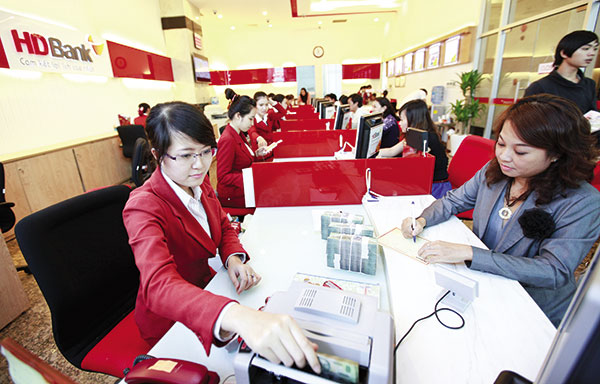Banks woo with fresh confidence
 |
| New laws and improved macro-economic conditions are drawing investors back to Vietnamese banks Photo: Le Toan |
Until recently, Vietnam’s banks remained a no-go zone for most investment funds, due to their chronic problems of non-performing loans and low levels of transparency. However, it seems that the financial industry regained some of its attractiveness this year, with new laws promising to tackle bad debts and international standards forcing banks to enhance their efficiency.
Foreign investors are taking notice of the banking sector’s improvements. Two weeks ago, the €417 million ($491.62 million) PYN Elite Fund spent $40 million on 4.99 per cent of TPBank’s shares, making its first foray into the domestic banking sector. In the year prior to this investment, TPBank also received $75 million of trade finance from the Asian Development Bank and $18 million of capital from the International Finance Corporation.
This shows investors’ newfound confidence in the bank, ranked in 2012 on the list of struggling lenders but having since cleaned up its bad loan portfolio and restructured its business.
In October, Vietnam Opportunity Fund (VOF), managed by VinaCapital Group, acquired a nearly 5 per cent stake at Orient Commercial Bank in a deal valued at $11 million. Andy Ho, chief investment officer of VinaCapital, said that this was “a rare opportunity” to buy a sizeable stake at a bank that has strong growth potential.
Finance is also one of the prioritised sectors for VOF in the next three years, as stated at its annual investor conference. Before its plunge into holdings at Orient Commercial Bank, Eximbank was the only investment that VOF had made in the banking sector.
Other commercial banks such as HDBank and Techcombank are also seeking foreign investors before their listings next year. HDBank’s representatives recently revealed that the bank will finalise selling 20 per cent of shares to four or five investors, aiming to raise $300 million.
Analyst Lam Nguyen from Viet Dragon Securities pointed out that Vietnamese banks can now accelerate their cleanup of bad debts thanks to a recovering economy, growing consumer confidence, and especially Resolution 42, which paves the way for banks to sell collaterals. A loosened monetary policy also helps with credit growth.
“Credit rating agencies such as S&P and Moody’s have upgraded their ratings for some Vietnamese banks, and financial institutions are enjoying a favourable macro-environment. The initiation of Resolution 42 will boost the recovery rate of bad debts,” Nguyen said.
According to Viet Dragon Securities, the banking industry in Vietnam achieved high profit growth in the first half of 2017, as net profits grew by 39 per cent from the same period last year, while return-on-equity increased to 7.5 per cent from 5.7 per cent.
It is interesting to note that at this moment, Vietnamese banks seem to be attracting more financial investors than strategic ones. A recent example is VPBank, which managed to raise $1.2 billion from 80 investment funds before its listing, after its refusal of strategic partnerships. CEO Nguyen Duc Vinh explained that it is difficult to find a strategic partner that shares the same vision with the bank.
“Some foreign banks see Vietnam just as a short-term investment, so they don’t bring their best practices to us. There are also conflicts between the banks’ international practices and the Vietnamese business environment,” said Vinh. VPBank previously partnered with Singapore’s OCBC Bank, between 2006 and 2013.
Economic expert Le Xuan Nghia pointed out that more and more financial investors are keen on Vietnamese banks, and their taste can be different from strategic partners. Specifically, instead of buying a small, struggling bank or an over-valued major one, financial investors now opt for up-and-coming small lenders.
“Foreign funds, as purely financial investors, tend to choose banks that have good corporate governance and strong growth potential,” said Nghia.
On the downside, according to Vietnamese law, a non-bank investor is only allowed to own at most 5 per cent of a Vietnamese bank, while a foreign bank can buy up to 10 per cent. This cap can be a challenge for investment funds competing to buy stakes at good lenders.
What the stars mean:
★ Poor ★ ★ Promising ★★★ Good ★★★★ Very good ★★★★★ Exceptional
Latest News
More News
- 0.1 per cent tax proposed on each transfer of digital assets (February 05, 2026 | 17:27)
- Ministry of Finance tightens policy delivery at start of year (February 05, 2026 | 17:26)
- Vietnam steps up market reforms as FTSE Russell reviews upgrade progress (February 05, 2026 | 17:20)
- 2025 profits mixed amid strong energy and farming results (February 05, 2026 | 17:18)
- Cashless payments hit 28 times GDP in 2025 (February 04, 2026 | 18:09)
- SSIAM and DBJ launch Japan Vietnam Capital Fund (February 04, 2026 | 15:57)
- Banks target stronger profits, credit growth in 2026 (February 04, 2026 | 15:43)
- Vietnam on path to investment-grade rating (February 03, 2026 | 13:07)
- Consumer finance sector posts sharp profit growth (February 03, 2026 | 13:05)
- Insurance market building the next chapter of protection (February 02, 2026 | 11:16)
















 Mobile Version
Mobile Version